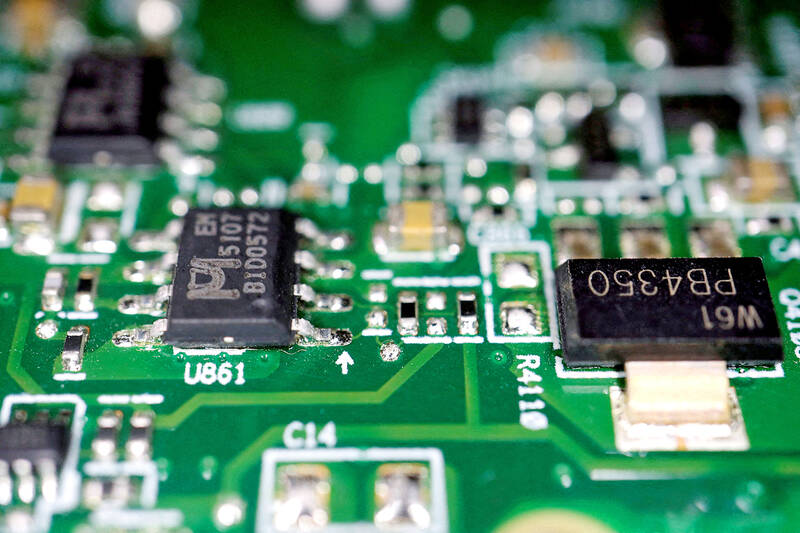The Philippines is trying to enlist Taiwanese chip giants to expand in semiconductors, a bid to catch up with its neighbors who are emerging as significant suppliers in the industry.
Taiwan Semiconductor Manufacturing Co (TSMC, 台積電) and United Microelectronics Corp (UMC, 聯電) are among companies the Philippines is reaching out to as it seeks equipment and expertise to build out chip fabrication operations, said Dan Lachica, head of the Southeast Asian country’s main electronics industry group, the Semiconductor and Electronics Industries in the Philippines Foundation Inc (SEIPI).
The association is working with Philippine officials in Taiwan to talk with potential partners.

Photo: Reuters
“What I am hoping is that TSMC or UMC or some other company aspiring for wafer fabs overseas is to consider: Send us your depreciated equipment, and in exchange, we’ll train the Filipino workers that you can deploy in your global operations,” Lachica said.
The country of more than 100 million people trails neighbors such as Malaysia and Singapore in the complex industry of chip manufacturing, where plants can require billions of dollars in initial investment. Taiwan is the world leader, and its companies including TSMC are expanding overseas to alleviate potential risks related to tensions between Taipei and Beijing.
TSMC representatives did not respond to a request for comment.
“It is UMC’s policy not to comment on market speculation,” a UMC spokesperson said in an e-mail.
The Philippines is betting that its low costs and ample workforce could help attract manufacturers. Talent shortage is one of the main challenges for global chipmakers from the US to Malaysia — the industry would need more than 1 million additional skilled workers across the world by 2030, Deloitte has estimated.
Taiwan and the Philippines enjoy a trade relationship, and both have recurring tensions with China. Beijing has repeatedly threatened Taiwan with invasion. Meanwhile, Philippine boats have clashed with Chinese vessels as the countries spar over the disputed South China Sea.
The SEIPI’s pitch is part of the country’s attempt to diversify beyond chip testing and packaging, a less advanced part of the manufacturing process that carries thin profit margins.
“We’re moving up the value chain as well in terms of IC design and hopefully, semiconductor wafer fab,” Lachica said.
The Philippines has lost ground to neighbors such as Vietnam over the past few years after a revamp of local incentive programs led to the flow of advanced manufacturing elsewhere, Lachica said.
The country’s electronics and semiconductor exports are set to contract by 10 percent this year because of inventory corrections, before rebounding by 5 percent next year, he said.
Philippine President Ferdinand Marcos Jr has backed a bill seeking to change the incentive regime to attract more foreign investors. Meanwhile, efforts backed by the US and Japan to build Philippine infrastructure bode well for the industry’s prospects.
“We are handicapped by the aggressiveness of Vietnam, Indonesia and Malaysia,” Lachica said. “We need to come up and essentially tell the world that the Philippines is open for business again.”

Sweeping policy changes under US Secretary of Health and Human Services Robert F. Kennedy Jr are having a chilling effect on vaccine makers as anti-vaccine rhetoric has turned into concrete changes in inoculation schedules and recommendations, investors and executives said. The administration of US President Donald Trump has in the past year upended vaccine recommendations, with the country last month ending its longstanding guidance that all children receive inoculations against flu, hepatitis A and other diseases. The unprecedented changes have led to diminished vaccine usage, hurt the investment case for some biotechs, and created a drag that would likely dent revenues and

Macronix International Co (旺宏), the world’s biggest NOR flash memory supplier, yesterday said it would spend NT$22 billion (US$699.1 million) on capacity expansion this year to increase its production of mid-to-low-density memory chips as the world’s major memorychip suppliers are phasing out the market. The company said its planned capital expenditures are about 11 times higher than the NT$1.8 billion it spent on new facilities and equipment last year. A majority of this year’s outlay would be allocated to step up capacity of multi-level cell (MLC) NAND flash memory chips, which are used in embedded multimedia cards (eMMC), a managed

CULPRITS: Factors that affected the slip included falling global crude oil prices, wait-and-see consumer attitudes due to US tariffs and a different Lunar New Year holiday schedule Taiwan’s retail sales ended a nine-year growth streak last year, slipping 0.2 percent from a year earlier as uncertainty over US tariff policies affected demand for durable goods, data released on Friday by the Ministry of Economic Affairs showed. Last year’s retail sales totaled NT$4.84 trillion (US$153.27 billion), down about NT$9.5 billion, or 0.2 percent, from 2024. Despite the decline, the figure was still the second-highest annual sales total on record. Ministry statistics department deputy head Chen Yu-fang (陳玉芳) said sales of cars, motorcycles and related products, which accounted for 17.4 percent of total retail rales last year, fell NT$68.1 billion, or

In the wake of strong global demand for AI applications, Taiwan’s export-oriented economy accelerated with the composite index of economic indicators flashing the first “red” light in December for one year, indicating the economy is in booming mode, the National Development Council (NDC) said yesterday. Moreover, the index of leading indicators, which gauges the potential state of the economy over the next six months, also moved higher in December amid growing optimism over the outlook, the NDC said. In December, the index of economic indicators rose one point from a month earlier to 38, at the lower end of the “red” light.